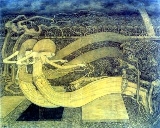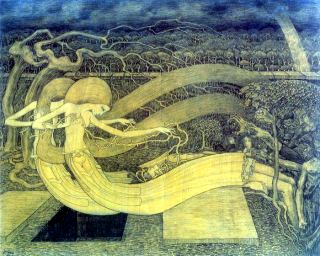
Witte Wieven
Encyclopedia

Legend
A legend is a narrative of human actions that are perceived both by teller and listeners to take place within human history and to possess certain qualities that give the tale verisimilitude...
s, the Witte Wieven (also known as Wittewijven) are spirits of "wise women
Völva
A vǫlva or völva is a shamanic seeress in Norse paganism, and a recurring motif in Norse mythology....
" (or else elven beings
Elf
An elf is a being of Germanic mythology. The elves were originally thought of as a race of divine beings endowed with magical powers, which they use both for the benefit and the injury of mankind...
). The mythology dates back at least to the pre-Christian era (7th century) and was known in the present-day regions of the Netherlands
Netherlands
The Netherlands is a constituent country of the Kingdom of the Netherlands, located mainly in North-West Europe and with several islands in the Caribbean. Mainland Netherlands borders the North Sea to the north and west, Belgium to the south, and Germany to the east, and shares maritime borders...
and Belgium
Belgium
Belgium , officially the Kingdom of Belgium, is a federal state in Western Europe. It is a founding member of the European Union and hosts the EU's headquarters, and those of several other major international organisations such as NATO.Belgium is also a member of, or affiliated to, many...
and parts of France
France
The French Republic , The French Republic , The French Republic , (commonly known as France , is a unitary semi-presidential republic in Western Europe with several overseas territories and islands located on other continents and in the Indian, Pacific, and Atlantic oceans. Metropolitan France...
. In some places they were known as Juffers or Joffers ("ladies"), or as Dames Blanches ("white ladies") in French.
Origins
Witte wieven literally means white women today, but "wise women" in dialects of the Low Saxon languageDutch Low Saxon
Dutch Low Saxon is a group of Low Saxon, i.e. West Low German dialects spoken in the northeastern Netherlands. In comparison, the remainder of the Netherlands speak a collection of Low Franconian dialects.The class "Dutch Low Saxon" is not unanimous...
of the Netherlands. The word witte in Dutch means white. Wit or witte meant "witty" or "wise", from the root word "weten" which means "to know." The word for wisdom was wijsheid. Witte wieven is often translated to be "white woman" (sources differ) as the words come from the same roots. The association of wise women with the color white was either an accidental translation error, or a symbolic color association for wisdom (sources differ).
Historically, the witte wieven are thought to be wise women, herbalist
Herbalist
An herbalist is:#A person whose life is dedicated to the economic or medicinal uses of plants.#One skilled in the harvesting and collection of medicinal plants ....
s and medicine healers who took care of people's physical and mental ailments (wala
Völva
A vǫlva or völva is a shamanic seeress in Norse paganism, and a recurring motif in Norse mythology....
in OHG
Old High German
The term Old High German refers to the earliest stage of the German language and it conventionally covers the period from around 500 to 1050. Coherent written texts do not appear until the second half of the 8th century, and some treat the period before 750 as 'prehistoric' and date the start of...
). It was said they had the talent for prophecy
Prophecy
Prophecy is a process in which one or more messages that have been communicated to a prophet are then communicated to others. Such messages typically involve divine inspiration, interpretation, or revelation of conditioned events to come as well as testimonies or repeated revelations that the...
and looking into the future. They had a high status in the communities, and so when they died ceremonies were held at their grave sites to honour them.
According to mythology
Mythology
The term mythology can refer either to the study of myths, or to a body or collection of myths. As examples, comparative mythology is the study of connections between myths from different cultures, whereas Greek mythology is the body of myths from ancient Greece...
, their spirits remained on earth, and they became living spirits (or elven
Elf
An elf is a being of Germanic mythology. The elves were originally thought of as a race of divine beings endowed with magical powers, which they use both for the benefit and the injury of mankind...
beings) that either helped or hindered people who encountered them. They tended to reside in the burial sites or other sacred places. It was thought that mist on a gravehill was the spirit of the wise woman appearing, and people would bring them offerings and ask for help.
While many scholars believe Witte Wieven originated as above from honoring graves of wise women, others think the mythology of witte wieven come from part of the Germanic belief in disen
Dísir
In Norse mythology, a dís is a ghost, spirit or deity associated with fate who can be both benevolent and antagonistic towards mortal people. Dísir may act as protective spirits of Norse clans...
, land wights
Landvættir
Landvættir are spirits of the land in Norse mythology and in Germanic neopaganism. They protect and promote the flourishing of the specific places where they live, which can be as small as a rock or a corner of a field, or as large as a section of a country.-The nature of landvættir:Some scholars...
, and/or alven (Old Dutch for "elf") for several reasons: The practice of bringing offerings and asking for help from their graves is very similar to honoring disen, land wights and alfen in Germanic paganism
Germanic paganism
Germanic paganism refers to the theology and religious practices of the Germanic peoples of north-western Europe from the Iron Age until their Christianization during the Medieval period...
. In addition, in some localities the mythological witte wieven were described directly as "Alfen" or "Alven".
Jacob Grimm
Jacob Grimm
Jacob Ludwig Carl Grimm was a German philologist, jurist and mythologist. He is best known as the discoverer of Grimm's Law, the author of the monumental Deutsches Wörterbuch, the author of Deutsche Mythologie and, more popularly, as one of the Brothers Grimm, as the editor of Grimm's Fairy...
mentioned them in the Deutsche Mythologie (1835) as the Dutch variant of the Germanic weisse frauen
Weisse Frauen
In German folklore, the Weisse Frauen are elven-like spirits that may have derived from Germanic paganism in the form of legends of light elves . They are described as beautiful and enchanted creatures who appear at noon and can be seen sitting in the sunshine brushing their hair or bathing in a...
: "The people of Friesland, Drenthe and the Netherlands have just as much to tell of their written wijven or juffers in hills and caverns ... though here they get mixed up with elvish personages."
Characterization
At first, early medieval literatureMedieval literature
Medieval literature is a broad subject, encompassing essentially all written works available in Europe and beyond during the Middle Ages . The literature of this time was composed of religious writings as well as secular works...
described the witte wieven more like pranksters and pests. Later Christian teaching transformed the idea of a "witte wieven" into mistflarden: ghost witches— recharacterized as evil and to be avoided.
In certain legends "Alvinne" was a ghost in a white cloak.
Legacy
The following places were named after witte wieven, and report witte wieven legends:In the Netherlands:
- Near the Village of EefdeEefdeEefde is a village in the Dutch province of Gelderland. It is located in the municipality of Lochem, about 3 km northeast of the city of Zutphen.-References:...
is Wittewievenbult: translates "Wise Women hill". Local legend holds that White Women appear on Christmas Eve every year and dance on this hill. - Near the Village of BarchemBarchemBarchem is a village in the Dutch province of Gelderland, located in the municipality Lochem, about 15 km east of the city of Zutphen.Barchem has about 1800 inhabitants....
is Wittewijvenkuil: translates "Wise Woman Pitt" is a pit between two local hills. Local legend holds that three white women lived there.
See also
- Dames BlanchesDames Blanches (folklore)In French mythology or folklore, Dames Blanches were female spirits or supenatural beings, comparable to the White Women of both Dutch and Germanic mythology. The Dames Blanches were reported in the region of Lorraine and Normandy...
(White women of French mythology, similar) - VölvaVölvaA vǫlva or völva is a shamanic seeress in Norse paganism, and a recurring motif in Norse mythology....
- Weisse FrauenWeisse FrauenIn German folklore, the Weisse Frauen are elven-like spirits that may have derived from Germanic paganism in the form of legends of light elves . They are described as beautiful and enchanted creatures who appear at noon and can be seen sitting in the sunshine brushing their hair or bathing in a...
(White women of German mythology, similar) - White Goddess (book by Robert Graves)
- White women (mythology)
Sources
- Grimm, Jacob (1835). Deutsche Mythologie (German Mythology); From English released version Grimm's Teutonic Mythology (1888); Available online by Northvegr © 2004-2007, Chapter 32, page 3.
- Reginheim. Heathen History of the Achterhoek. 2002. Files retrieved 02-24-2007
- Reginheim. Witte wieven. 2007. (in English) File retrieved 03-08-2007.
External links
- Witte wieven by Varhalen (in Dutch)
- lycos/newpage3 (in Dutch)

